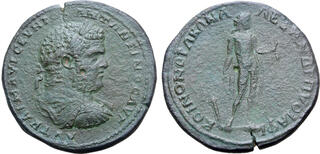| Roma Numismatics Ltd > E-Sale 115 | Auction date: 21 December 2023 |
| Lot number: 666 Price realized: 360 GBP (Approx. 456 USD / 416 EUR) Note: Prices do not include buyer's fees. | Show similar lots on CoinArchives Find similar lots in upcoming auctions on |
| Lot description: Caracalla Æ Medallion of Philippopolis, Thrace. Circa AD 214-215. Alexandria Pythia games commemorative. AVT KAI M AVP CEVHPOC ANTΩNEINOC AVΓ, laureate, draped and cuirassed bust to right / KOINON ΘPAKΩN AΛEZANΔP ΠVθIA ΦI, athlete standing to right, holding bow; quiver set on ground to left. Varbanov, Philippopolis XV.1.2.2; Varbanov -; BMC -. 39.91g, 42mm, 7h. Very Fine. Very Rare. Ex Roma Numismatics Ltd., E-Sale 61, 2 August 2019, lot 510. The Pythian Games were one of four international games which were considered the most prestigious in the ancient world. It had been running since the sixth century alongside the Olympic, Nemean and Isthmian Games, and was used as a model for the many new contests which sprung up in cities throughout the later Greek and Roman periods. This medallion is part of a series struck to commemorate the games held at Philippopolis to celebrate the visit of Caracalla as he travelled through Thrace during his campaigning against the Parthians in AD 214. As indicated by this reverse legend, the games were named Alexandria in honour of Alexander III of Macedon. The admiration Caracalla held for Alexander III is recorded by Cassius Dio, who suggests the emperor sought to imitate his hero by wearing Macedonian weaponry and parading with elephants (78.7.1-4). This account is supported by Herodian who suggests the emperor's campaign in the east was part of an attempt to associate himself with Alexander (4.8.1). Despite this, official imagery does not suggest there was an attempt to assimilate the image or attributes of Alexander with Caracalla himself, at least not in the same way that Commodus associated himself with Hercules (see RIC Commodus 251). Still, it is notable that Philippopolis chose to hail the games Alexandria on occasion of Caracalla's visit to the city. It has been suggested that the naming of the event may have been an attempt to flatter Caracalla and gain imperial favour, and perhaps the event itself shaped some the behaviour described by contemporary sources (see M. Raycheva, On Caracalla, Elephants and the Alexandreia Games in Philippopolis in Studia Classica Serdicensia V, pp. 276-289 (Sofia, 2016). Estimate: 300 GBP |  |


